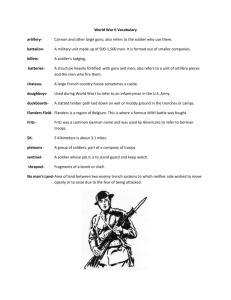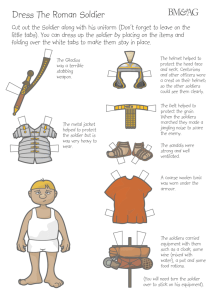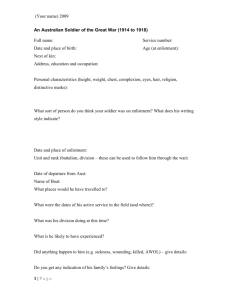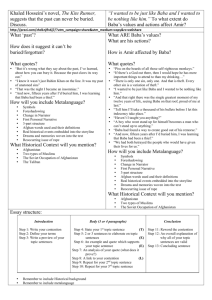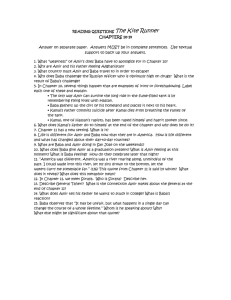Kite Runner Literary Analysis Answer Guide
advertisement
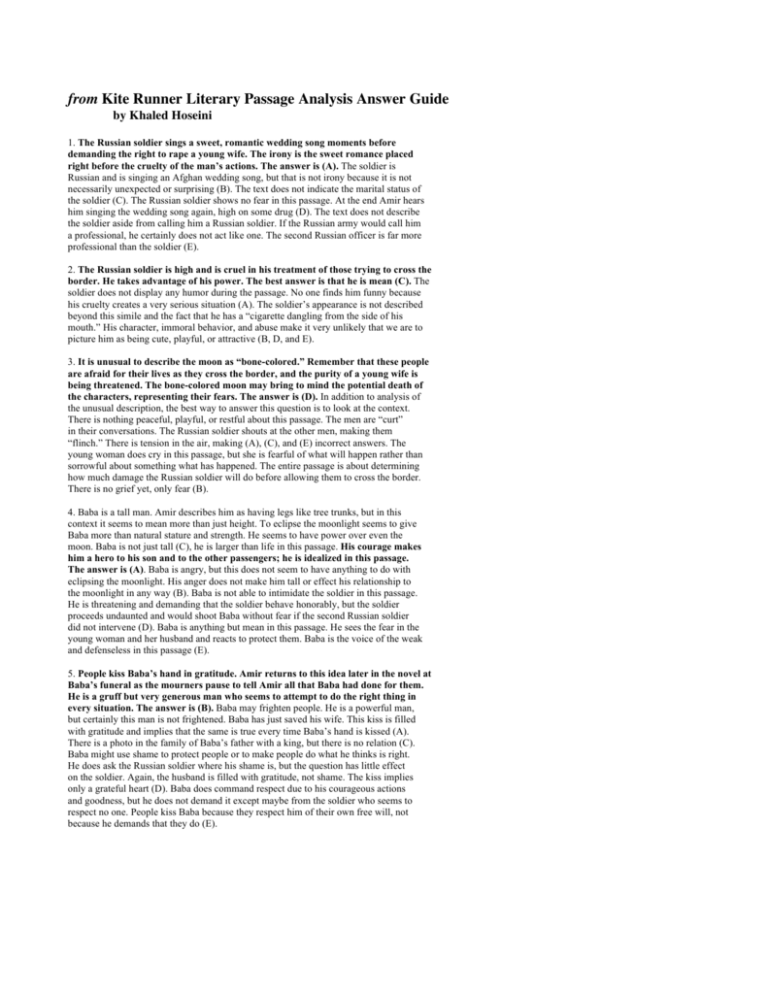
from Kite Runner Literary Passage Analysis Answer Guide by Khaled Hoseini 1. The Russian soldier sings a sweet, romantic wedding song moments before demanding the right to rape a young wife. The irony is the sweet romance placed right before the cruelty of the man’s actions. The answer is (A). The soldier is Russian and is singing an Afghan wedding song, but that is not irony because it is not necessarily unexpected or surprising (B). The text does not indicate the marital status of the soldier (C). The Russian soldier shows no fear in this passage. At the end Amir hears him singing the wedding song again, high on some drug (D). The text does not describe the soldier aside from calling him a Russian soldier. If the Russian army would call him a professional, he certainly does not act like one. The second Russian officer is far more professional than the soldier (E). 2. The Russian soldier is high and is cruel in his treatment of those trying to cross the border. He takes advantage of his power. The best answer is that he is mean (C). The soldier does not display any humor during the passage. No one finds him funny because his cruelty creates a very serious situation (A). The soldier’s appearance is not described beyond this simile and the fact that he has a “cigarette dangling from the side of his mouth.” His character, immoral behavior, and abuse make it very unlikely that we are to picture him as being cute, playful, or attractive (B, D, and E). 3. It is unusual to describe the moon as “bone-colored.” Remember that these people are afraid for their lives as they cross the border, and the purity of a young wife is being threatened. The bone-colored moon may bring to mind the potential death of the characters, representing their fears. The answer is (D). In addition to analysis of the unusual description, the best way to answer this question is to look at the context. There is nothing peaceful, playful, or restful about this passage. The men are “curt” in their conversations. The Russian soldier shouts at the other men, making them “flinch.” There is tension in the air, making (A), (C), and (E) incorrect answers. The young woman does cry in this passage, but she is fearful of what will happen rather than sorrowful about something what has happened. The entire passage is about determining how much damage the Russian soldier will do before allowing them to cross the border. There is no grief yet, only fear (B). 4. Baba is a tall man. Amir describes him as having legs like tree trunks, but in this context it seems to mean more than just height. To eclipse the moonlight seems to give Baba more than natural stature and strength. He seems to have power over even the moon. Baba is not just tall (C), he is larger than life in this passage. His courage makes him a hero to his son and to the other passengers; he is idealized in this passage. The answer is (A). Baba is angry, but this does not seem to have anything to do with eclipsing the moonlight. His anger does not make him tall or effect his relationship to the moonlight in any way (B). Baba is not able to intimidate the soldier in this passage. He is threatening and demanding that the soldier behave honorably, but the soldier proceeds undaunted and would shoot Baba without fear if the second Russian soldier did not intervene (D). Baba is anything but mean in this passage. He sees the fear in the young woman and her husband and reacts to protect them. Baba is the voice of the weak and defenseless in this passage (E). 5. People kiss Baba’s hand in gratitude. Amir returns to this idea later in the novel at Baba’s funeral as the mourners pause to tell Amir all that Baba had done for them. He is a gruff but very generous man who seems to attempt to do the right thing in every situation. The answer is (B). Baba may frighten people. He is a powerful man, but certainly this man is not frightened. Baba has just saved his wife. This kiss is filled with gratitude and implies that the same is true every time Baba’s hand is kissed (A). There is a photo in the family of Baba’s father with a king, but there is no relation (C). Baba might use shame to protect people or to make people do what he thinks is right. He does ask the Russian soldier where his shame is, but the question has little effect on the soldier. Again, the husband is filled with gratitude, not shame. The kiss implies only a grateful heart (D). Baba does command respect due to his courageous actions and goodness, but he does not demand it except maybe from the soldier who seems to respect no one. People kiss Baba because they respect him of their own free will, not because he demands that they do (E).
